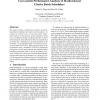Free Online Productivity Tools
i2Speak
i2Symbol
i2OCR
iTex2Img
iWeb2Print
iWeb2Shot
i2Type
iPdf2Split
iPdf2Merge
i2Bopomofo
i2Arabic
i2Style
i2Image
i2PDF
iLatex2Rtf
Sci2ools
CCGRID
2002
IEEE
2002
IEEE
User-Centric Performance Analysis of Market-Based Cluster Batch Schedulers
This paper presents a performance analysis of marketbased batch schedulers for clusters of workstations. In contrast to previous work, we use user-centric performance metrics as the basis for system evaluation. Each user is modeled as having a utility function for each job which measures value delivered to the user as function of execution time. Summing over all utility functions in the workload, we use aggregate utility as a measure of overall value delivered to users. With aggregate utility as the performance metric, simulations are used to quantify the performance of both market-based and traditional batch scheduling algorithms under a variety of synthetic workloads. Results show that an auction-based batch scheduling algorithm improves performance by a factor of up to 2-5x for sequential workloads and up to 14x for highly parallel workloads compared to traditional scheduling algorithms.
Batch Scheduling Algorithm | CCGRID 2002 | Distributed And Parallel Computing | Performance Metric | Utility Functions |
| Added | 14 Jul 2010 |
| Updated | 14 Jul 2010 |
| Type | Conference |
| Year | 2002 |
| Where | CCGRID |
| Authors | Brent N. Chun, David E. Culler |
Comments (0)

